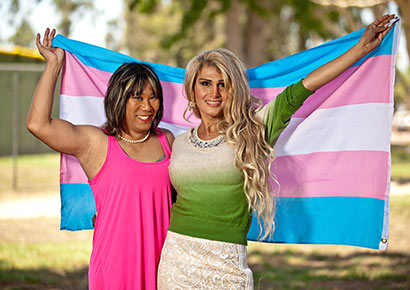Breakthrough as WHO affirms being transgender not a mental disorder
 South African activists have welcomed the groundbreaking decision by the World Health Organisation (WHO) to stop classifying gender incongruence as a mental disorder.
South African activists have welcomed the groundbreaking decision by the World Health Organisation (WHO) to stop classifying gender incongruence as a mental disorder.
The change was announced as part of the launch of the WHO’s new International Statistical Classification of Diseases and Related Health Problems (ICD) this week, the global guide’s first revision in 18 years.
The ICD provides categories for health conditions found in humans and is used by countries around the world to build statistics and reports that map their citizens’ well-being.
In the new version, released on Monday, gender incongruence has been moved out of the category of mental disorders, into the section on sexual health conditions. The organisation defines gender incongruence as “a marked and persistent incongruence between an individual’s experienced gender and the assigned sex…”
The WHO said that while “evidence is now clear that [gender incongruence] is not a mental disorder, and indeed classifying it in this can cause enormous stigma for people who are transgender,” there remain significant health care needs that can best be met if the condition remains in the ICD, under the category of a sexual health condition.
“It was taken out of mental health disorders because we have a better understanding that this wasn’t actually a mental health condition and leaving it there was causing stigma,” commented Dr Lale Say, Coordinator, Adolescents and at-Risk Populations Team at the WHO.
“Removing gender incongruence from the mental health chapter is expected to reduce stigma and will help better social acceptance of individuals living with gender incongruence,” added Say. “It may even increase access [to healthcare] because it will… help individuals to seek care more.”
Liberty Matthyse, Executive Director of Cape Town based Gender DynamiX, welcomed the move by the WHO as “a positive change and a breakthrough moment that allows us to speak about the experiences of diverse transgender persons without having to use stigmatising language and perpetuating negative ideas.”
She said that, “This shift is critical and the beginning of many more as we continue our work in creating a better world for all of us.”
While for many a complete removal from the ICD “would have been the ideal,” its inclusion as a sexual health condition in the guidelines will help transgender persons to continue to secure healthcare services, explained Matthyse.
“In the lead up to these developments many concerns were shared as to the negative effects [of completely removing gender incongruence] that may be encountered by transgender persons in different African contexts who depend on pathologisation for the possibility of being able to access ‘treatment’ from the state,” said Matthyse. “We need to be conscious of the lived realities of diverse transgender persons located in different socio-economic and legal-political contexts.”
Matthyse expressed hope that the development will assist with ongoing conversations with the South African government “to review the Alteration of Sex Description and Sex Status Act 49 of 2003 to do away with medical requirements to prove our transgender identities.” She added that it should also help healthcare practitioners and professionals “to practice healthcare in a gender affirming manner.”
OUT LGBT Well-being in Pretoria said that the WHO’s decision was a step forward for the LGBTQ community. “We hope this long overdue move will play a part in reducing the marginalisation and stigma faced by transgender and gender diverse people,” commented OUT’s Health Manager, Johan Meyer.
“We know that transgender individuals are at higher risk of HIV, in large part because of the stigma they face and the legitimate fear that they will be abused or discriminated against when they seek health care and other services,” said Meyer.
According to OUT’s 2016 Love Not Hate study, 47% of transgender South Africans had experienced some form of discrimination in the previous 24 months. Of these respondents, 13% reported being sexually abused or raped and 13% had experienced other forms of violence. When it comes to health care, 15% said they had been discriminated against.
Homosexuality as a mental disorder was removed from the ICD in 1990. The 11th edition of the ICD will be presented to the World Health Assembly in May 2019 for adoption by countries.
Leave a Reply